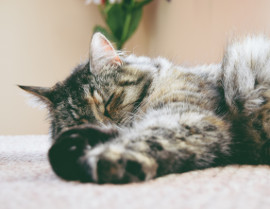 This time of year, we’re inundated with questions from cat owners about hairballs. Cats have grown their full winter coat, and have more dense hair now than any other time of year. With this comes a lot of extra grooming and licking, often resulting in an increase in hairballs.
This time of year, we’re inundated with questions from cat owners about hairballs. Cats have grown their full winter coat, and have more dense hair now than any other time of year. With this comes a lot of extra grooming and licking, often resulting in an increase in hairballs.
Hairballs, while relatively safe, can cause intestinal blockages, which can be very serious for cats. Overall, dealing with hairballs can be unpleasant for both the kitty and for the person on cleanup duty.
But what exactly are hairballs, and why do they happen?
When cats lick themselves, they inevitably ingest hair. Some cats consume more hair than others, particularly longer-haired breeds. For the most part, a healthy cat should almost always pass hair through their digestive system with no issue. Nevertheless, there are instances where hairballs may be vomited, and depending on the frequency of the hairballs, some assistance may be needed to keep them in check.
The occasional hairball is generally not a cause for concern, however frequent hairballs may be a symptom of an underlying condition that may require veterinary attention.
What can I do to decrease the risk of my cat developing hairballs?
Frequent brushing is the first and most important step in hairball prevention. By regularly removing the loose hair, you will significantly reduce the amount of hair your kitty will consume.
Be sure to use the grooming tools conducive to your cat’s coat; short-coated cats do best with rubber palm brushes and furminators, where longer-coated cats may need a slicker brush and an undercoat rake.
Another simple way of helping reduce hairballs is to make sure your cat is getting enough dietary fibre. Low fibre diets make it difficult for the digestive system to pass hairballs. Consider switching to a higher fibre diet or add a fibre supplement, like psyllium or pumpkin, for a great digestive boost.
Skin and coat supplements may provide help in reducing shedding. Adding a quality source of omega fatty acids, like fish oil or sprouted seed powder, will enrich the quality of your cat’s skin and coat. This will help reduce profuse shedding of dead hair from dry skin.
Lastly, stress levels can be a big factor in shedding. Cats who are under frequent stress or anxiety will lose considerably more fur compared to a calm and relaxed kitty. Many pet owners are turning to calming supplements, like CBD oil, to quell nerves.
How can I be proactive?
Being proactive in hairball prevention is easy for most cat owners – all you have to do is follow these simple guidelines:
-
Feed a wholesome, high-quality diet.
-
Brush frequently (1-3 times per week).
-
Ensure your cat has healthy sources of omega fatty acids and dietary fibre.
With all that said, hairballs are not always indicative of a healthy cat – especially if the hairballs happen often. Frequent hairballs may be a symptom of a more serious problem, like inflammatory bowel disease or intestinal cancer. Likewise if the hairball contains strange colours, like red, green, or yellow. If any of these red flags pop up, contact your veterinarian immediately.
Brandon Forder – also known as The Pet Expert – is vice-president of Canadian Pet Connection, a family-owned and -operated business located in Meaford. He has over twenty-five years of experience specializing in pet nutrition, behaviour, and healthy pet lifestyles. Canadian Pet Connection is an industry leader committed to providing their clients with the highest levels of personal, attentive service. Learn more at www.CanadianPetConnection.ca.











